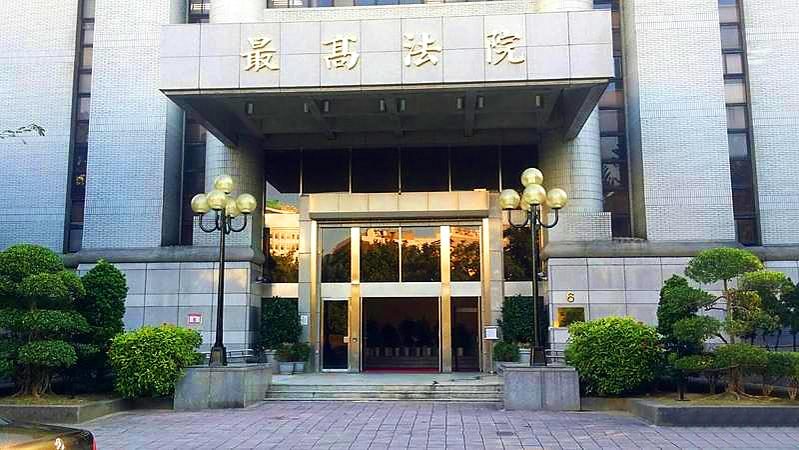The Supreme Court yesterday upheld a two-and-a-half-year prison term for an elderly Taipei man surnamed Chen (陳) in a “compassionate killing” case.
Chen, 79, was convicted in 2020 of suffocating to death his daughter, who had been bedridden since childhood due to cerebral palsy and had severe mental disability.
In court trials, Chen said he and his wife had attended to all details of their daughter’s daily life, including feeding, washing and cleaning after bodily functions, for nearly 50 years. He had been the sole caregiver in recent years after his wife also fell ill.

Photo: Wu Cheng-feng, Taipei Times
In February 2020, Chen said his daughter developed a toothache and body pain, and it was heartbreaking to see her in agony, but he could not help alleviate the pain.
Neither could he take her to a hospital due to fears of infection and COVID-19 restrictions, he said.
According to court transcripts, Chen said his daughter had taken sedatives for so long, he believed painkillers and anesthetics would not help her.
He said he therefore decided to end her suffering once for all and smothered her to death with a thick blanket. Regretting his action, he tried to kill himself, but was revived by medics.
In the first trial, the Taipei District Court noted his difficult circumstances and handed a lenient minimum sentence of two years and six months, which was upheld by the High Court and affirmed by the Supreme Court upon appeal.
The lower court said Chen had been a responsible father who diligently cared for his daughter for 50 years.
Throughout this period, the parents had to stay home and had no social activities, and were under heavy mental and physical stress, it said, recommending a minimum punishment on “compassionate grounds.”
It also suggested a presidential pardon.
Yesterday’s ruling rejected a request by Chen’s lawyer for a suspended sentence.
The Supreme Court said the two-and-a-half year term was already a grant of leniency, and that a suspended sentence only applies to prison terms of two years or less.
It added that judicial courts have no authority to recommend a presidential pardon.

A preclearance service to facilitate entry for people traveling to select airports in Japan would be available from Thursday next week to Feb. 25 at Taiwan Taoyuan International Airport, Taoyuan International Airport Corp (TIAC) said on Tuesday. The service was first made available to Taiwanese travelers throughout the winter vacation of 2024 and during the Lunar New Year holiday. In addition to flights to the Japanese cities of Hakodate, Asahikawa, Akita, Sendai, Niigata, Okayama, Takamatsu, Kumamoto and Kagoshima, the service would be available to travelers to Kobe and Oita. The service can be accessed by passengers of 15 flight routes operated by

Chinese spouse and influencer Guan Guan’s (關關) residency permit has been revoked for repeatedly posting pro-China videos that threaten national security, the National Immigration Agency confirmed today. Guan Guan has said many controversial statements in her videos posted to Douyin (抖音), including “the red flag will soon be painted all over Taiwan” and “Taiwan is an inseparable part of China,” and expressing hope for expedited reunification. The agency last year received multiple reports alleging that Guan Guan had advocated for armed reunification. After verifying the reports, the agency last month issued a notice requiring her to appear and explain her actions. Guan

GIVE AND TAKE: Blood demand continues to rise each year, while fewer young donors are available due to the nation’s falling birthrate, a doctor said Blood donors can redeem points earned from donations to obtain limited edition Formosan black bear travel mugs, the Kaohsiung Blood Center said yesterday, as it announced a goal of stocking 20,000 units of blood prior to the Lunar New Year. The last month of the lunar year is National Blood Donation Month, when local centers seek to stockpile blood for use during the Lunar New Year holiday. The blood demand in southern Taiwan — including Tainan and Kaohsiung, as well as Chiayi, Pingtung, Penghu and Taitung counties — is about 2,000 units per day, the center said. The donation campaign aims to boost

The Central Weather Administration (CWA) said a magnitude 4.9 earthquake that struck off the coast of eastern Taiwan yesterday was an independent event and part of a stress-adjustment process. The earthquake occurred at 4:47pm, with its epicenter at sea about 45.4km south of Yilan County Hall at a depth of 5.9km, the CWA said. The quake's intensity, which gauges the actual effects of a temblor, was highest in several townships in Yilan and neighboring Hualien County, where it measured 4 on Taiwan's seven-tier intensity scale, the CWA said. Lin Po-yu (林柏佑), a division chief at the CWA's Seismological Center, told a news conference